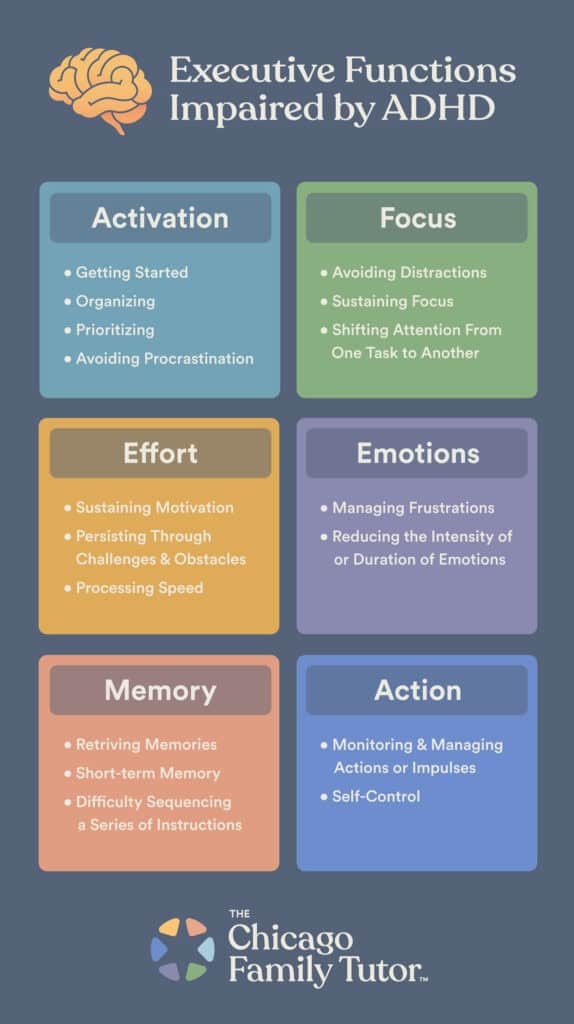Table of Contents
Understanding the Spectrum of Executive Functioning
Have you ever wondered if everyone might have ADHD at some point in their lives? Of course, everyone experiences trouble focusing or difficulty regulating emotions from time to time. However, a diagnosis is reserved for those who have struggled consistently, often from childhood, and who have experienced negative consequences as a result.
What is ADHD?
According to the Centers for Disease Control and Prevention (CDC), ADHD is “one of the most common neurodevelopmental disorders of childhood.” 1 It is characterized by patterns of inattention, hyperactivity, impulsivity, and emotional dysregulation. Although traditionally diagnosed in children, ADHD is increasingly recognized in adults, many of whom are only now receiving diagnoses that shed light on their lifelong struggles (CDC, 2021).
These symptoms can cause significant challenges in school, at work, and at home, often negatively impacting an individual’s self-esteem and exacerbating their symptoms. However, it’s important to note that while everyone experiences difficulties with focus or emotional regulation occasionally, a diagnosis of ADHD is reserved for those with persistent issues that significantly impair their daily functioning.
A Brief History of ADHD
The concept of ADHD has evolved significantly since its first medical documentation by British pediatrician Sir George Frederic Still in 1902, who described it as a “Defect of Moral Control.” Initially focusing on behavioral issues like hyperactivity, the understanding of ADHD expanded in the mid-20th century when it was recognized as “Hyperkinetic Reaction of Childhood” in the DSM-II. 2
In 1980, the term “Attention Deficit Disorder (ADD)” was introduced in the DSM-III, acknowledging attention deficits as well as hyperactivity. Today, recognized as “Attention Deficit/Hyperactivity Disorder” in the DSM-5, ADHD is understood as involving a complex interplay of genetic and neurological factors, underscoring its recognition as a multifaceted neurodevelopmental disorder. 3
This concise history shows the progression from seeing ADHD as merely unruly behavior to recognizing it as a comprehensive neurological condition.
ADHD & Executive Functioning Skills
ADHD is not quite as black and white as it may seem. According to Ralph Lewis, MD, a more accurate way of looking at ADHD is as it relates to the spectrum of executive functioning skills. 4
Executive functioning skills are defined by Lewis as “a set of cognitive processes and mental skills that help an individual plan, monitor, and successfully execute their goals.” These are skills and abilities for which we all possess varying degrees of proficiency, and include:
- Attentional control: the lack of which is a symptom often associated with ADHD.
- Time management: Planning and executing tasks within set time limits.
- Problem solving: Effectively addressing an issue and devising a workable solution.
- Task initiation: Starting tasks without undue procrastination.

Furthermore, they are not static and may change with time. For example, even someone who does not have a history of struggling with executive functioning may have a period of readjustment when going through major life changes like a promotion or the arrival of a child.
Women may also find that they vary in executive functioning abilities depending on where they are in their menstrual cycle. Thus, we are all on an ever-changing continuum. According to Lewis, those with ADHD are just those who fall “toward the left end of the bell curve.”
Therefore, while we may all have a tough day from time to time, it is the ongoing nature of symptoms despite best efforts that may lead to an official diagnosis.
Success regardless of diagnosis
Just because you haven’t received a diagnosis doesn’t mean that you aren’t struggling. And just because you are struggling doesn’t mean that you need a diagnosis. The beauty of executive functioning skills is that, like any other skills, they can be practiced and developed over time.
Therefore, it can be valuable to see yourself as a fallible human being and a work in progress, rather than as a diagnosis or a set of symptoms. Those with ADHD diagnoses and those without can all benefit from working on their executive functioning skills.
Here are a few strategies to enhance your executive functioning skills:
- Organizational tools: Use planners or digital apps to keep track of tasks and deadlines.
- Mindfulness techniques: Engage in practices like meditation to improve concentration and emotional control.
- Structured routines: Establish consistent daily routines to aid task initiation and time management.
If you find that you aren’t sure where to begin or you are overwhelmed at the prospect, please reach out to us at The Chicago Family Tutor to learn more about how we can help.
Conclusion
ADHD affects many, but not everyone has it, and not everyone who struggles with executive functioning needs a diagnosis. Understanding and developing our executive functioning skills can help us all, regardless of where we fall on the spectrum. Ready to harness your executive functions? Contact The Chicago Family Tutor today to discover personalized strategies that empower you and your loved ones to succeed.
1 https://www.cdc.gov/ncbddd/adhd/facts.html
2 American Psychiatric Association. (1968). Diagnostic and Statistical Manual of Mental Disorders: Second Edition (DSM-II). Washington, DC: American Psychiatric Association.
3 American Psychiatric Association. (2013). Diagnostic and Statistical Manual of Mental Disorders: Fifth Edition (DSM-5). Washington, DC: American Psychiatric Association.
4 https://www.psychologytoday.com/us/blog/finding-purpose/202208/the-real-reason-everyone-seems-to-have-adhd-these-days
FAQs
Resources for Further Learning
Books
Driven to Distraction by Edward M. Hallowell, M.D., and John J. Ratey, M.D.: A foundational book that explores the nature of ADHD, offering insight and compassionate guidance to those affected by it.
Smart but Scattered by Peg Dawson and Richard Guare: Focuses on practical techniques to improve executive functioning skills at any age.
Podcasts
Distraction: Hosted by Dr. Ned Hallowell, this podcast explores living with ADHD and how to turn it from a disadvantage into a strength.
ADHD reWired: Hosted by Eric Tivers, featuring discussions on diverse aspects of coping with ADHD including strategies, tools, and insights.
Websites
CHADD (Children and Adults with Attention-Deficit/Hyperactivity Disorder):
www.chadd.org — A leading resource on ADHD, offering support and information on treatment options and advocacy.
ADDitude Magazine:
www.additudemag.com — Provides strategies and support for ADHD and related conditions, including expert guidance and community insights.

